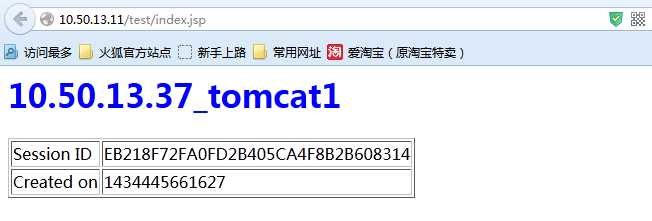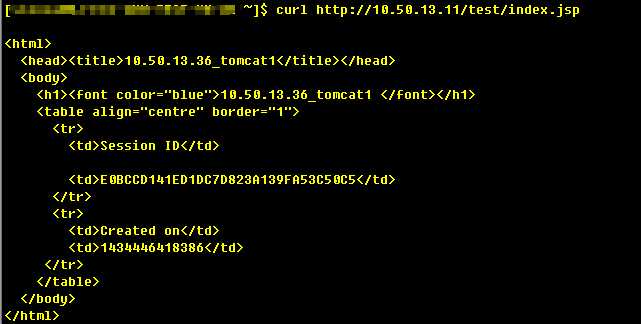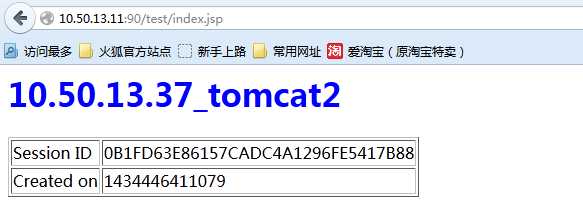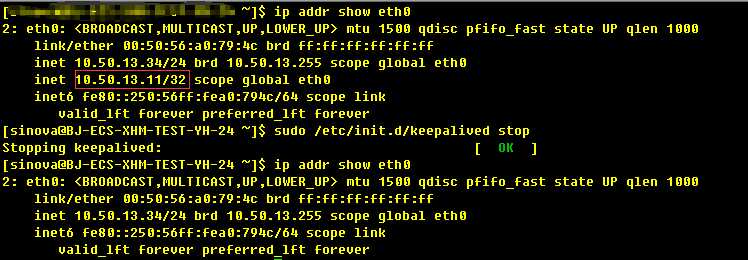标签:
一.概述
LVS作用:实现负载均衡
Keepalived作用:监控集群系统中各个服务节点的状态,HA cluster。
配置LVS有两种方式:
1. 通过ipvsadm命令行方式配置
2. 通过Redhat提供的工具piranha来配置LVS
软件下载:
ipvsadm下载地址:
http://www.linuxvirtualserver.org/software/kernel-2.6/
Keepalived下载地址:
http://www.keepalived.org/software/
安装包版本:
ipvsadm-1.24.tar.gz
keepalived-1.2.2.tar.gz
操作系统版本:
Red Hat Enterprise Linux Server release 6.4 (Santiago)
二.服务器IP规划:
|
服务器 |
IP地址 |
网关 |
虚拟设备名 |
虚拟IP(VIP) |
部署应用 |
|
Master Director Server |
10.50.13.34 |
10.50.13.1 |
eth0:0 |
10.50.13.11 |
LVS+keepalived |
|
Backup Director Server |
10.50.13.35 |
10.50.13.1 |
eth0:0 |
10.50.13.11 |
LVS+keepalived |
|
Real server1 |
10.50.13.36 |
10.50.13.1 |
lo:0 |
10.50.13.11 |
Nginx+tomcat |
|
Real server2u |
10.50.13.37 |
10.50.13.1 |
lo:0 |
10.50.13.11 |
Nginx+tomcat |
三.LVS安装配置
1.通过ipvsadm软件配置LVS,在Director Serve上安装IPVS管理软件
通过如下命令检查kernel是否已经支持LVS的ipvs模块:
$ modprobe -l |grep ipvs
kernel/net/netfilter/ipvs/ip_vs.ko
kernel/net/netfilter/ipvs/ip_vs_rr.ko
kernel/net/netfilter/ipvs/ip_vs_wrr.ko
kernel/net/netfilter/ipvs/ip_vs_lc.ko
kernel/net/netfilter/ipvs/ip_vs_wlc.ko
kernel/net/netfilter/ipvs/ip_vs_lblc.ko
kernel/net/netfilter/ipvs/ip_vs_lblcr.ko
kernel/net/netfilter/ipvs/ip_vs_dh.ko
kernel/net/netfilter/ipvs/ip_vs_sh.ko
kernel/net/netfilter/ipvs/ip_vs_sed.ko
kernel/net/netfilter/ipvs/ip_vs_nq.ko
kernel/net/netfilter/ipvs/ip_vs_ftp.ko
如果有类似上面的输出,表明系统内核已经默认支持了IPVS模块。接着就可以安装IPVS管理软件了。
2. 安装ipvsadm
$ tar zxf ipvsadm-1.24.tar.gz
$ cd ipvsadm-1.24
$ sudo make
$ sudo make install
make时可能会遇到报错,由于编译程序找不到对应内核的原因,执行以下命令后继续编译
$ ln -s /usr/src/kernels/2.6.18-164.el5-x86_64/ /usr/src/linux
3. ipvsadm配置
为了管理和配置的方便,将ipvsadm配置写成启停脚本:
$ cat lvsdr
#!/bin/bash
# description: Start LVS of Director server
VIP=10.50.13.11
RIP=`echo 10.50.13.{36..37}`
. /etc/rc.d/init.d/functions
case "$1" in
start)
echo " start LVS of Director Server"
# set the Virtual IP Address and sysctl parameter
/sbin/ifconfig eth0:0 ${VIP} broadcast ${VIP} netmask 255.255.255.255 up
/sbin/route add -host ${VIP} dev eth0:0
#echo "1" >/proc/sys/net/ipv4/ip_forward
#Clear IPVS table
/sbin/ipvsadm -C
#set LVS
/sbin/ipvsadm -A -t ${VIP}:80 -s rr -p 600
/sbin/ipvsadm -A -t ${VIP}:90 -s rr -p 600
for rip in ${RIP};do
/sbin/ipvsadm -a -t ${VIP}:80 -r ${rip}:80 -g
/sbin/ipvsadm -a -t ${VIP}:90 -r ${rip}:90 -g
done
#Run LVS
/sbin/ipvsadm
;;
stop)
echo "close LVS Directorserver"
#echo "0" >/proc/sys/net/ipv4/ip_forward
/sbin/ipvsadm -C
/sbin/ifconfig eth0:0 down
;;
*)
echo "Usage: $0 {start|stop}"
exit 1
esac
然后把文件放到/etc/init.d下,执行:
$ chomd +x /etc/init.d/lvsdr
$ service lvsdr start
4. Real server 配置
在lvs的DR和TUN模式下,用户的访问请求到达真实服务器后,是直接返回给用户的,而不再经过前端的Director Server,因此,就需要在每个Real server节点上增加虚拟的VIP地址,这样数据才能直接返回给用户,增加VIP地址的操作可以通过创建脚本的方式来实现,创建文件/etc /init.d/lvsrs,脚本内容如下:
$ cat /etc/init.d/lvsrs
#!/bin/bash
VIP=10.50.13.11
/sbin/ifconfig lo:0 ${VIP} broadcast ${VIP} netmask 255.255.255.255 up
/sbin/route add -host ${VIP} dev lo:0
echo "1" >/proc/sys/net/ipv4/conf/lo/arp_ignore
echo "2" >/proc/sys/net/ipv4/conf/lo/arp_announce
echo "1" >/proc/sys/net/ipv4/conf/all/arp_ignore
echo "2" >/proc/sys/net/ipv4/conf/all/arp_announce
sysctl -p
四.Keepalived安装配置
以下是通过具有sudo权限的普通用户安装的。
tar zxf keepalived-1.2.2.tar.gz
cd keepalived-1.2.2
./configure --sysconf=/etc --with-kernel-dir=/usr/src/kernels/2.6.32-358.el6.x86_64
sudo make
sudo make install
sudo cp /usr/local/sbin/keepalived /sbin/keepalived
配置keepalived
Keepavlived的配置文件在/etc/keepalived/目录下,编辑后的keepavlived的MASTER配置文件如下:
$ cat /etc/keepalived/keepalived.conf
! Configuration File for keepalived
global_defs {
notification_email {
Eivll0m@xxx.com
}
notification_email_from keepalived@localhost
smtp_server 10.50.13.34
smtp_connect_timeout 30
router_id LVS_MASTER
}
vrrp_instance VI_1 {
state MASTER
interface eth0
virtual_router_id 51
priority 100
advert_int 1
authentication {
auth_type PASS
auth_pass 1111
}
virtual_ipaddress {
10.50.13.11
}
notify_master "/etc/init.d/lvsdr start"
notify_backup "/etc/init.d/lvsdr stop"
}
virtual_server 10.50.13.11 80 {
delay_loop 2
lb_algo rr
lb_kind DR
#nat_mask 255.255.255.0
persistence_timeout 50
protocol TCP
real_server 10.50.13.36 80 {
weight 1
TCP_CHECK {
connect_timeout 3
nb_get_retry 3
delay_before_retry 3
}
}
real_server 10.50.13.37 80 {
weight 1
TCP_CHECK {
connect_timeout 3
nb_get_retry 3
delay_before_retry 3
}
}
virtual_server 10.50.13.11 90 {
delay_loop 2
lb_algo rr
lb_kind DR
#nat_mask 255.255.255.0
persistence_timeout 50
protocol TCP
real_server 10.50.13.36 90 {
weight 1
TCP_CHECK {
connect_timeout 3
nb_get_retry 3
delay_before_retry 3
}
}
real_server 10.50.13.37 90 {
weight 1
TCP_CHECK {
connect_timeout 3
nb_get_retry 3
delay_before_retry 3
}
}
}
BACKUP配置文件如下:
$ cat /etc/keepalived/keepalived.conf
! Configuration File for keepalived
global_defs {
notification_email {
Eivll0m@xxx.com
}
notification_email_from keepalived@localhost
smtp_server 10.50.13.35
smtp_connect_timeout 30
router_id LVS_BACKUP
}
vrrp_instance VI_1 {
state BACKUP
interface eth0
virtual_router_id 51
priority 90
advert_int 1
authentication {
auth_type PASS
auth_pass 1111
}
virtual_ipaddress {
10.50.13.11
}
notify_master "/etc/init.d/lvsdr start"
notify_backup "/etc/init.d/lvsdr stop"
}
virtual_server 10.50.13.11 80 {
delay_loop 2
lb_algo rr
lb_kind DR
#nat_mask 255.255.255.0
persistence_timeout 50
protocol TCP
real_server 10.50.13.36 80 {
weight 1
TCP_CHECK {
connect_timeout 3
nb_get_retry 3
delay_before_retry 3
}
}
real_server 10.50.13.37 80 {
weight 1
TCP_CHECK {
connect_timeout 3
nb_get_retry 3
delay_before_retry 3
}
}
virtual_server 10.50.13.11 80 {
delay_loop 2
lb_algo rr
lb_kind DR
#nat_mask 255.255.255.0
persistence_timeout 50
protocol TCP
real_server 10.50.13.36 90 {
weight 1
TCP_CHECK {
connect_timeout 3
nb_get_retry 3
delay_before_retry 3
}
}
real_server 10.50.13.37 90 {
weight 1
TCP_CHECK {
connect_timeout 3
nb_get_retry 3
delay_before_retry 3
}
}
}
keepalived启动方法:
/etc/init.d/keepalived start
五.nginx、tomcat安装配置
1.安装nginx
$ tar zxf nginx-1.6.1.tar.gz
$ cd nginx-1.6.1
$ ./configure --prefix=/app/nginx --with-http_ssl_module --with-http_realip_module --add-module=/app/soft/nginx-sticky
$ make
$ make install
2.nginx配置:
upstream test_80 {
sticky;
server 10.50.13.36:8080;
server 10.50.13.37:8080;
}
upstream test_90 {
sticky;
server 10.50.13.36:8090;
server 10.50.13.37:8090;
}
server {
listen 80;
server_name localhost;
.....
location ^~ /test/ {
proxy_pass http://test_80;
proxy_set_header Host $host;
proxy_set_header X-Real-IP $remote_addr;
proxy_set_header X-Forwarded-For $proxy_add_x_forwarded_for;
}
server {
listen 90;
server_name localhost;
.....
location ^~ /test/ {
proxy_pass http://test_80;
proxy_set_header Host $host;
proxy_set_header X-Real-IP $remote_addr;
proxy_set_header X-Forwarded-For $proxy_add_x_forwarded_for;
}
3.安装tomcat(简单,过程略)
10.50.13.36/37每台机器各安装两个tomcat,端口分别启用8080和8090
安装路径:/app/tomcat、/app/tomcat2
4.给tomcat准备测试文件
10.50.13.36:
$ mkdir /app/tomcat/webapps/test
$ cd /app/tomcat/webapps/test
$ vi index.jsp #添加如下内容
<%@ page language="java" %>
<html>
<head><title>10.50.13.36_tomcat1</title></head>
<body>
<h1><font color="blue">10.50.13.36_tomcat1 </font></h1>
<table align="centre" border="1">
<tr>
<td>Session ID</td>
<% session.setAttribute("abc","abc"); %>
<td><%= session.getId() %></td>
</tr>
<tr>
<td>Created on</td>
<td><%= session.getCreationTime() %></td>
</tr>
</table>
</body>
</html>
$ mkdir /app/tomcat/webapps/test
$ cd /app/tomcat/webapps/test
$ vi index.jsp #添加如下内容
<%@ page language="java" %>
<html>
<head><title>10.50.13.36_tomcat2</title></head>
<body>
<h1><font color="blue">10.50.13.36_tomcat2 </font></h1>
<table align="centre" border="1">
<tr>
<td>Session ID</td>
<% session.setAttribute("abc","abc"); %>
<td><%= session.getId() %></td>
</tr>
<tr>
<td>Created on</td>
<td><%= session.getCreationTime() %></td>
</tr>
</table>
</body>
</html>
10.50.13.37:
$ mkdir /app/tomcat/webapps/test
$ cd /app/tomcat/webapps/test
$ vi index.jsp #添加如下内容
<%@ page language="java" %>
<html>
<head><title>10.50.13.37_tomcat1</title></head>
<body>
<h1><font color="blue">10.50.13.37_tomcat1 </font></h1>
<table align="centre" border="1">
<tr>
<td>Session ID</td>
<% session.setAttribute("abc","abc"); %>
<td><%= session.getId() %></td>
</tr>
<tr>
<td>Created on</td>
<td><%= session.getCreationTime() %></td>
</tr>
</table>
</body>
</html>
$ mkdir /app/tomcat/webapps/test
$ cd /app/tomcat/webapps/test
$ vi index.jsp #添加如下内容
<%@ page language="java" %>
<html>
<head><title>10.50.13.37_tomcat2</title></head>
<body>
<h1><font color="blue">10.50.13.37_tomcat7 </font></h1>
<table align="centre" border="1">
<tr>
<td>Session ID</td>
<% session.setAttribute("abc","abc"); %>
<td><%= session.getId() %></td>
</tr>
<tr>
<td>Created on</td>
<td><%= session.getCreationTime() %></td>
</tr>
</table>
</body>
</html>
六.测试
通过浏览器访问http://10.50.13.11/test/index.jsp

查看LVS统计信息:

通过curl访问http://10.50.13.11/test/index.jsp

查看LVS统计信息:

通过浏览器访问http://10.50.13.11:90/test/index.jsp

查看LVS统计信息:可以看到10.50.13.11:dnsix有变化了。

keepalived测试,停掉master上的keepalived服务,看看VIP是否会漂移到BACKUP上面


通过以上测试发现,BACKUP已正常接管服务了。
LVS+Keepalived+Nginx+Tomcat高可用负载均衡集群配置(DR模式,一个VIP,多个端口)
标签:
原文地址:http://www.cnblogs.com/Eivll0m/p/4580826.html